After Six Years of Pretrial Appeals, Waffle House Sex Tape Case Can Move to Discovery
Pretrial appeals are now exhausted and discovery can begin in a civil racketeering case against three attorneys who used a secret sex tape recorded by their client to try to secure millions of dollars from Waffle House chairman Joe Rogers Jr.
January 17, 2020 at 02:47 PM
5 minute read
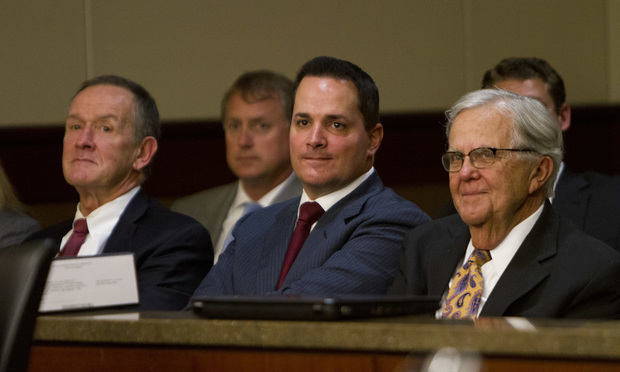 The lawyers being sued for alleged extortion are (from left) John Butters, David Cohen and Hylton Dupree Jr. (Photo: John Disney/ALM)
The lawyers being sued for alleged extortion are (from left) John Butters, David Cohen and Hylton Dupree Jr. (Photo: John Disney/ALM)
After six years of appellate wrangling, a civil racketeering lawsuit against three attorneys over a secret sex tape of Waffle House chairman Joe Rogers Jr. is finally cleared to begin pretrial discovery over whether their actions on behalf of Rogers' former housekeeper constituted attempted extortion.
The Supreme Court of Georgia resolved the last of a lengthy string of pretrial appeals without comment, clearing the way for Rogers and his counsel to begin securing evidence to bolster claims that lawyers for his former housekeeper advised her in making a surreptitious recording of a sexual encounter with the executive.
In 2014, Rogers sued attorney David Cohen, the founder and principal partner of the Complex Law Group in Atlanta; John Butters, a former Cobb County assistant district attorney now in private practice; and Hylton Dupree, a partner in the Marietta firm Dupree & Kimbrough, after the trio of lawyers accused him of sexually harassing their client, Mye Brindle.
The high court on Dec. 23 let stand a 2019 ruling in the case by the Georgia Court of Appeals affirming Rogers' right to pursue racketeering, attempted extortion and invasion of privacy claims.
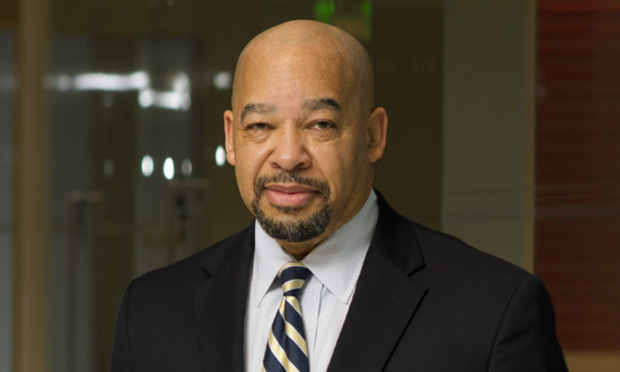 William Hill, Seyfarth Shaw, Atlanta. (Photo: John Disney/ALM)
William Hill, Seyfarth Shaw, Atlanta. (Photo: John Disney/ALM)"I've got to give it to the plaintiffs," said Seyfarth Shaw partner William Hill, a former Fulton County Superior Court judge who filed the racketeering complaint for Rogers in 2014. "They did a very good job of tying the case up as long as possible in prediscovery, pretrial motions."
"It's highly unusual to have six or seven years of appellate litigation in any case either before or after discovery," said Marietta attorney Robert Ingram, who represented Rogers in a separate invasion of privacy suit against Brindle. That case, which included a harassment counterclaim by Brindle, settled confidentially as the civil trial opened last year.
Last year, the Court of Appeals greenlighted Rogers' claims that Brindle conspired with her attorneys to secretly record a sexual encounter of the two in 2012. The suit includes claims that Brindle worked in concert with her lawyers to produce the video and that it was key to an alleged extortion scheme to secure millions of dollars from Rogers in return for Brindle's silence.
The suit claims that a demand letter from Cohen revealing the tape's existence and intimating that any publicity associated with potential litigation could be ruinous to Rogers was an attempt to extort money from him. Brindle's lawyers eventually suggested in preliminary settlement talks that Rogers pay the former housekeeper $12 million to quietly settle, according to court papers.
Brindle made the recording after consulting with Cohen and Butters regarding a potential sexual harassment claim against Rogers, according to court papers and court testimony.
Rogers' suit also claims the secret sex tape violated the state's eavesdropping law, which makes it illegal for anyone to record "[a]ny person, through the use of any device without the consent of all persons observed, to observe, photograph, or record the activities of another which occur in any private place and out of public view."
Cohen, Butters and Brindle were acquitted of violating the law by a Fulton County jury in 2018 after they were indicted on charges based on the secret sex tape. But as the jury deliberated, Fulton County District Attorney Paul Howard unsuccessfully attempted to stop deliberations, claiming the trial judge erroneously instructed the jury on the eavesdropping law.
John Floyd, a partner at Atlanta's Bondurant, Mixson & Elmore who represents Cohen and Butters, declined to comment. Dupree's attorney, Tom Cauthorn of Marietta law firm Cauthorn Nohr & Owen, couldn't be reached for comment.
Hill said the case is significant because the defense put forth by Cohen, Butters and Dupree implicitly rests on the assumption that, "Our bar license gives us leeway to violate the law."
Ingram agreed with that assessment. "When does a lawyer cross the line from being an advocate for their client to being a willing participant in tortious conduct?" he said. "Can a lawyer get a pass because they have a bar card when they are involved with their client in committing tortious conduct?"
Hill said that, as soon as the case is formally sent back to Cobb County, Senior Superior Court Judge Martha Christian "will put everybody to work."
Christian was appointed to hear the case after Cohen moved to recuse the original presiding judge, Cobb Superior Court Judge Robert Leonard, after Leonard placed the sex tape under seal and disqualified Butters and Cohen from continuing to represent Brindle.
Leonard subsequently stepped down. The remainder of the Cobb Superior Court bench then recused from hearing the case, paving the way for Christian's appointment.
This content has been archived. It is available through our partners, LexisNexis® and Bloomberg Law.
To view this content, please continue to their sites.
Not a Lexis Subscriber?
Subscribe Now
Not a Bloomberg Law Subscriber?
Subscribe Now
NOT FOR REPRINT
© 2025 ALM Global, LLC, All Rights Reserved. Request academic re-use from www.copyright.com. All other uses, submit a request to [email protected]. For more information visit Asset & Logo Licensing.
You Might Like
View All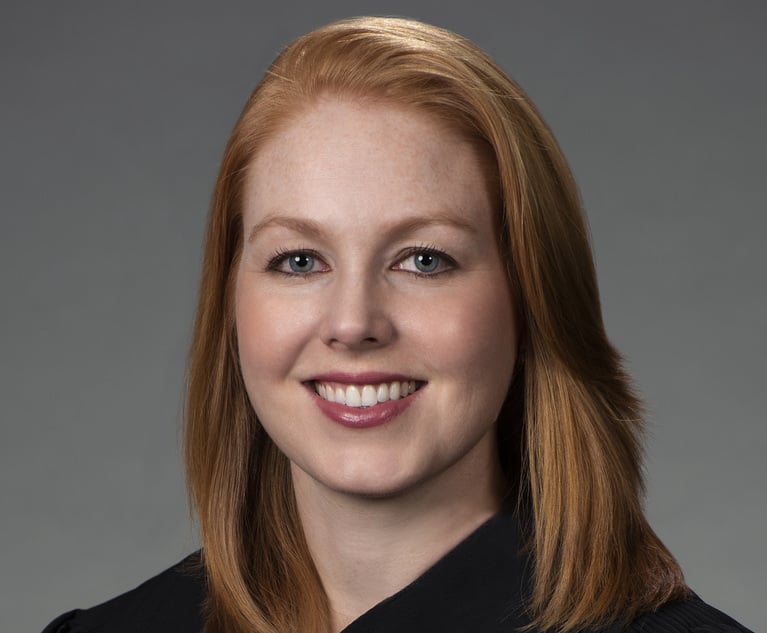
Justice Known for Asking 'Tough Questions' Resolves to Improve Civility
4 minute read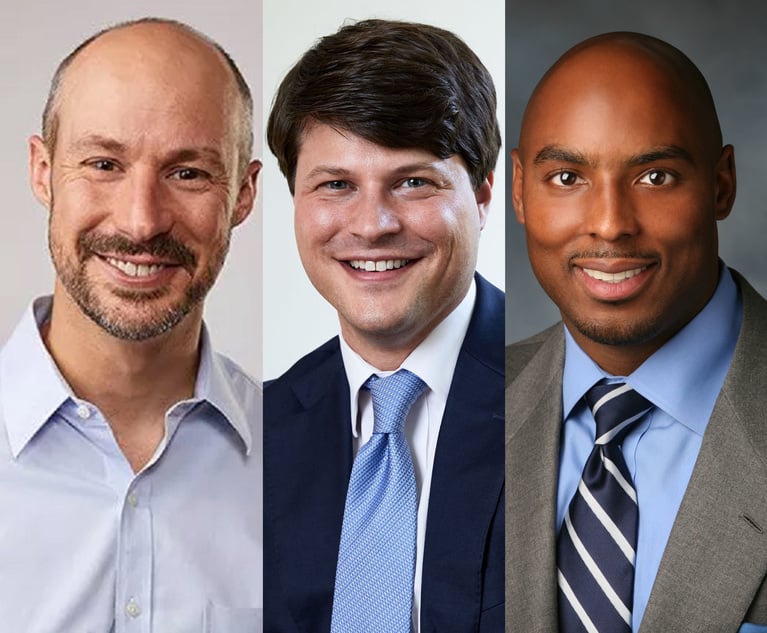

Alston & Bird Adds M&A, Private Equity Team From McDermott in New York
4 minute read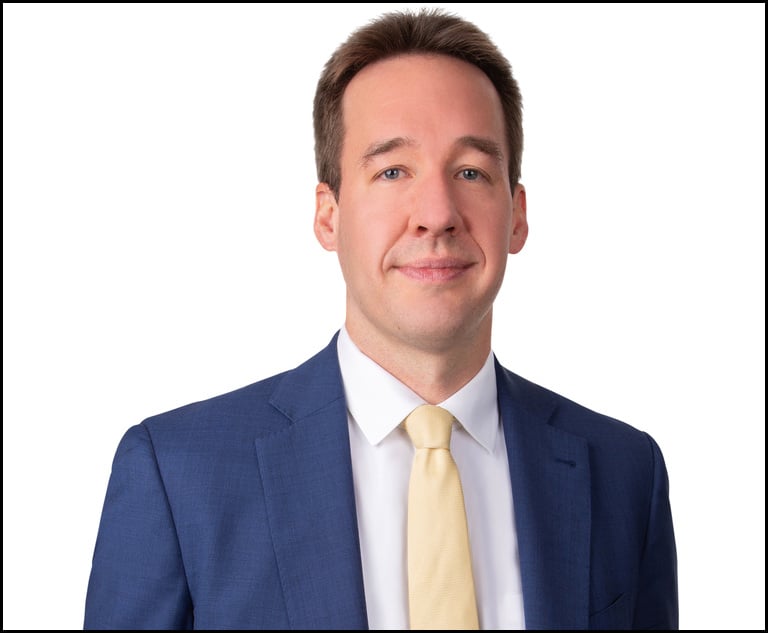
Veteran Federal Trade Law Enforcer Joins King & Spalding in Washington
4 minute readTrending Stories
- 1Balch & Bingham Elects New Partners, Adds Litigator From Jones Walker
- 2People in the News—Jan. 16, 2025—McGuireWoods, High Swartz
- 3'Pushed Into Oncoming Traffic': $5.85M Settlement in Mediated Auto Tort
- 4The Marble Palace Blog: Supreme Court Books You Should Read in 2025
- 5Avoiding Legal Risks: Crafting a Strong Do Not Call Policy for Compliance
Who Got The Work
J. Brugh Lower of Gibbons has entered an appearance for industrial equipment supplier Devco Corporation in a pending trademark infringement lawsuit. The suit, accusing the defendant of selling knock-off Graco products, was filed Dec. 18 in New Jersey District Court by Rivkin Radler on behalf of Graco Inc. and Graco Minnesota. The case, assigned to U.S. District Judge Zahid N. Quraishi, is 3:24-cv-11294, Graco Inc. et al v. Devco Corporation.
Who Got The Work
Rebecca Maller-Stein and Kent A. Yalowitz of Arnold & Porter Kaye Scholer have entered their appearances for Hanaco Venture Capital and its executives, Lior Prosor and David Frankel, in a pending securities lawsuit. The action, filed on Dec. 24 in New York Southern District Court by Zell, Aron & Co. on behalf of Goldeneye Advisors, accuses the defendants of negligently and fraudulently managing the plaintiff's $1 million investment. The case, assigned to U.S. District Judge Vernon S. Broderick, is 1:24-cv-09918, Goldeneye Advisors, LLC v. Hanaco Venture Capital, Ltd. et al.
Who Got The Work
Attorneys from A&O Shearman has stepped in as defense counsel for Toronto-Dominion Bank and other defendants in a pending securities class action. The suit, filed Dec. 11 in New York Southern District Court by Bleichmar Fonti & Auld, accuses the defendants of concealing the bank's 'pervasive' deficiencies in regards to its compliance with the Bank Secrecy Act and the quality of its anti-money laundering controls. The case, assigned to U.S. District Judge Arun Subramanian, is 1:24-cv-09445, Gonzalez v. The Toronto-Dominion Bank et al.
Who Got The Work
Crown Castle International, a Pennsylvania company providing shared communications infrastructure, has turned to Luke D. Wolf of Gordon Rees Scully Mansukhani to fend off a pending breach-of-contract lawsuit. The court action, filed Nov. 25 in Michigan Eastern District Court by Hooper Hathaway PC on behalf of The Town Residences LLC, accuses Crown Castle of failing to transfer approximately $30,000 in utility payments from T-Mobile in breach of a roof-top lease and assignment agreement. The case, assigned to U.S. District Judge Susan K. Declercq, is 2:24-cv-13131, The Town Residences LLC v. T-Mobile US, Inc. et al.
Who Got The Work
Wilfred P. Coronato and Daniel M. Schwartz of McCarter & English have stepped in as defense counsel to Electrolux Home Products Inc. in a pending product liability lawsuit. The court action, filed Nov. 26 in New York Eastern District Court by Poulos Lopiccolo PC and Nagel Rice LLP on behalf of David Stern, alleges that the defendant's refrigerators’ drawers and shelving repeatedly break and fall apart within months after purchase. The case, assigned to U.S. District Judge Joan M. Azrack, is 2:24-cv-08204, Stern v. Electrolux Home Products, Inc.
Featured Firms
Law Offices of Gary Martin Hays & Associates, P.C.
(470) 294-1674
Law Offices of Mark E. Salomone
(857) 444-6468
Smith & Hassler
(713) 739-1250






